Why The Women Of 'Star Wars' Don't Need Romance
I'm sure you can picture the scene: Our two heroes, one male and one female, suddenly realize they are under attack. What happens next? Male hero grabs female hero's hand and shouts something blatantly obvious like "Run!" This is a movie trope that has irked me for quite a while; I can't imagine that holding someone's hand while running for my life would be at all conducive to the task. And though it may seem like an insignificant quibble, I see it as indicative of the larger Hollywood trend of prioritizing the male storyline while, well, dragging the woman's along behind.And this is why a scene from Star Wars: The Force Awakens, in which Rey repeatedly tells off Finn for grabbing her hand as they run away from the invading First Order, is so refreshing and vindicating.Just as this trope reflects the problematic portrayal of women in blockbusters, Rey's character reflects the changing nature of these portrayals – she's fierce but vulnerable, physically capable but at times emotionally naive. In sum, she's a real human, not just some sexy lamp. In many ways, Rey represents a break from traditionally portrayed female characters, even in – or especially in – an action-adventure movie like Star Wars. And I hope her character will make another, very specific crack in the glass ceiling and triumphantly complete her journey without any semblance of a romance plot – and without any man deigning to "take her hand."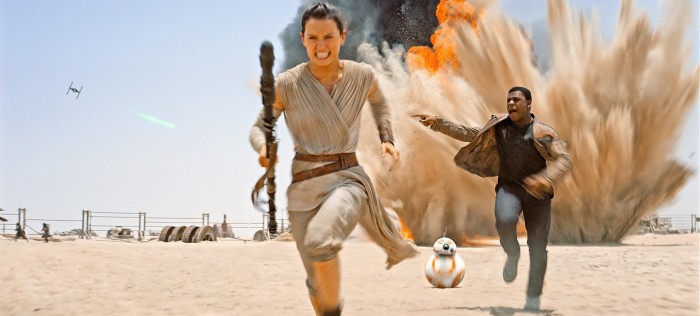
“Someday, My Prince Will Come”
I'm not trying to argue that all relationships are imbalanced and that the marriage inherently implies a negation of feminist ideals. Yet, if you consider the phenomenon of Disney princesses through the ages, there had always been a decisive push towards romantic love. Sure, each heroine had her own personality and her own struggles, but their collective happy ending necessitated finding their respective prince charmings. Show of hands for the women in the audience: who remembers gagging at the memory of your younger self belting out songs like "Someday My Prince Will Come"? I'm as much a Disney snob as the next millennial, but I shudder to consider my childhood self's anachronistic view of what determines a young woman's worth.Of course, recent Disney features have made great strides in rectifying the arc of the female hero. In Brave and Moana, the lack of love interests functions as a means of asserting each protagonist's independence and free-spirited nature, allowing them to better explore their own conflicting motivations and duties. Frozen, meanwhile, showcases a different kind of love – the unbreakable bond between sisters – as a refreshing alternative to the hackneyed and traditional "happily ever after" ending between a princess and a prince. Though the Bechdel Test is not always a foolproof measure of a movie's attitude towards women (Thor: Ragnorok, for example, starred two women in groundbreaking, complicated roles, and should not be discounted simply because these two women don't share a scene), the idea behind it is still solid: women should not exist onscreen solely in relation to the men with whom they share the screen.So often the issue is a matter of how romantic love is portrayed. Unfortunately, heteronormativity still reigns on the big screen, so for our purposes "romantic love" is almost exclusively reserved for a woman and a man. And with mostly men in the writers' rooms, the woman's side of the relationship tends to be underwritten – as though the character herself is buckling under the pressure of the unrelenting male gaze. Even Wonder Woman, which is hailed as the second coming of the lady messiah in feminist shrines, falls prey to this phenomenon. Diana has been hailed as an unapologetically "feminine" hero in that she doesn't simply fit in the Strong Female Character trope box. And that's a good thing – creating a memorable female action hero doesn't just mean grafting a woman into a man's role and calling it a day. She can melt at the sight of a baby and salivate over ice cream and preach the importance of kindness and still kick ass in a skirt.The one thing that bothered me about Diana's character in Wonder Woman was – you guessed it – her romance plot. I have zero problems with Steve Trevor, especially since Chris Pine is the greatest Hollywood Chris. His character's deference towards Diana is something we absolutely need to see more of, both on film and on the street and in boardrooms and clubs and beyond. But when Diana loses focus while fighting the literal god of war in a bombastic Snydervision spectacle because she's trying to figure out her feelings for some guy, I completely lost it. Diana's breathy cries of "Steve! Steve!" will haunt my nightmares for years to come.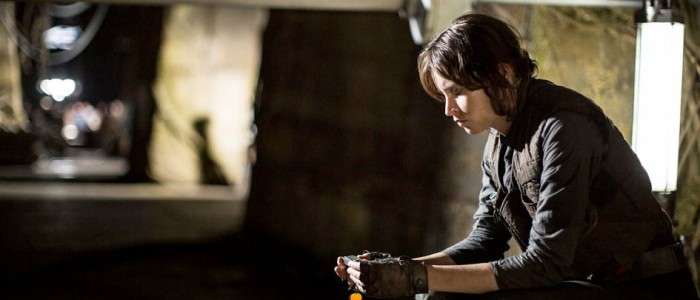
The Forced Romance of Jyn Erso
In recent years, the Star Wars franchise has been good to its female characters, crafting fully realized women of all ages and backgrounds and imbuing each with a different motivation and arc. Unfortunately, there have been a lot of missteps as well – all of which involve demeaning romance plots.Rogue One almost accomplished something revolutionary by showcasing a morally fluid, abrasive female anti-hero in Jyn Erso. But Jyn was reportedly deemed too unlikable a character, hence the film's now-infamous reshoots. I can't claim to know which scenes were in the original cut of the film and which were added during the reshoots period, but certain ones – such as Jyn throwing herself into the line of fire on Jedha to rescue a crying child – definitely seem like hastily inserted afterthoughts. I don't necessarily have an issue with making characters more likable – I'm personally not the anti-hero type. But I do have an issue with shoehorning in a romance as an attempt to "humanize" the female anti-hero.There is no evidence of any romantic interest between Jyn and Cassian Andor throughout Rogue One until they start making googly eyes at each other in an elevator down to the Scarif shore. There is a tragedy in the fact that the two of them had so little time to even explore a relationship before their imminent demise, but the real heart of Rogue One should have been the broken and ever-so-briefly repaired relationship between Jyn and her father, Galen. Despite my frustration and, frankly, bewilderment with the rest of the film, Galen Erso's remorseful but hopeful hologram message to Jyn on Jedha – a scene that is buoyed by Michael Giacchino's gorgeous, mournful score – never fails to bring tears to my eyes. The parent-child relationship is a key, driving theme in Star Wars stories, and Rogue One explores this idea beautifully through Galen and Jyn. Rogue One already had a core relationship – why wasn't that enough? The brief, forced romance offers far less emotional impact and implies that Jyn is only relatable now that she has demonstrated the ability to forge a romantic relationship with a man. If the romance with Cassian was slipped in to make Jyn more "likable," then frankly, I rebel.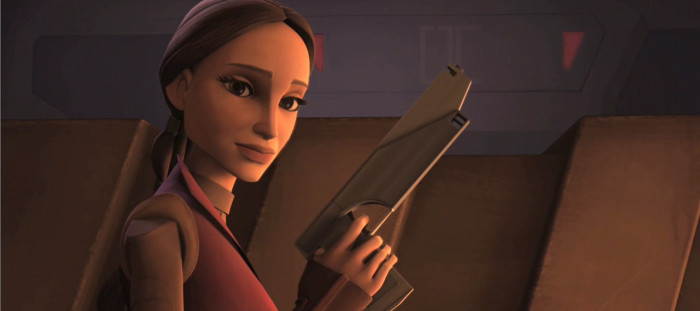
Bad Romance for Women in ‘Star Wars’
Another morally dubious female character whose arc is derailed by an impromptu romance is Asajj Ventress. Ventress is one of the most electrifying characters to come out of The Clone Wars, so I was thrilled to continue following her story in Christie Golden's Dark Disciple novel, itself an adaptation of shuttered episodes of The Clone Wars originally written by George Lucas's daughter, Katie.The majority of the novel is a scintillating slew of witty barbs and stealthy saber-play. But then (spoiler alert if you plan on reading the book) this bitter, betrayal-ravaged character with the dark side coursing through her veins is abruptly "redeemed" by falling in love with rogue Jedi Quinlan Vos, at which point they both become soppy shells of their former selves. A head-over-heels romance like this feels completely unrealistic given their respective backgrounds. Asajj Ventress, hardened villain, self-sufficient badass, traumatized by life, going weak in the knees for a carefree jokester? Three cheers for the "power of love" trope, but when applied to a character whose entire being is tied to the dark side, it doesn't just feel like a cheap cop-out, it completely undermines her complexity as a unique character – and especially, in this case, as the rare female villain. Imagine if Darth Maul had had a similar ending!And then, of course, there's Padmé Amidala. George Lucas has one of the most brilliant storytelling minds alive, but unfortunately, even he could not concoct a narrative in which Darth Vader's iconic "I am your father" revelation doesn't retroactively end with a baby-maker getting fridged. The whole situation is even more painful because Padmé is such a fabulous character in the first two prequel movies and even more so in The Clone Wars: she is a benevolent but firm queen, a persistent and sharp-minded senator, and a generous and thoughtful friend. But Revenge of the Sith reduces her to a blubbering pregnant lady in customized Coruscant maternity-wear who does nothing else but pine for her husband day and night, until she dies in childbirth because she "loses the will to live." Poor Padmé Amidala is the prototypical example of how wrong a woman's story can go when her life – and her death – suddenly becomes all about her man.Padmé's fate is unfortunately echoed by Duchess Satine Kryze, another Clone Wars character I adore. Satine's death hearkens back to the most egregious examples of the fridging trope, marring an otherwise truly excellent lineup of multifaceted female characters throughout The Clone Wars. I still view Satine as an important member of that crop, but it's impossible to gloss over the manner of her death: Darth Maul, intent on exacting revenge on Obi-Wan Kenobi, lures him to Mandalore by imprisoning the Duchess and then killing her right in front of his eyes. There's a fitting dramatic irony to the fact that Satine, an outspoken pacifist, dies by violence, but it's galling to consider that she is murdered in furtherance of the male star's story – especially because the intensity of the non-relationship between Obi-Wan Kenobi and Satine Kryze is what's so compelling; their repudiation of romance in the face of duty is both a tragic and honest reflection on both of their characters. That's what good storytelling is all about.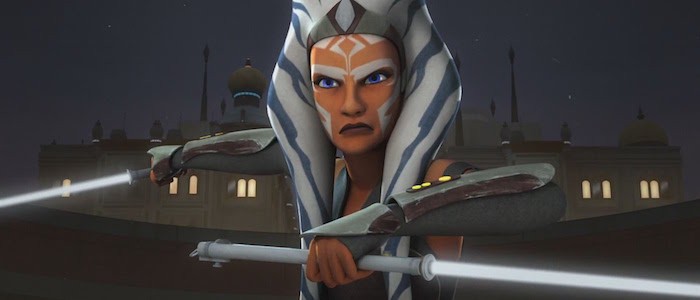
Women in ‘Star Wars’ Strike Back
But perhaps mishandled female characters are a thing of the past in the Star Wars universe. Ahsoka Tano, AKA the best Star Wars character of all time (fight me), is, like Padmé and Satine, another female character who needed to be written out of the story before a particular movie (in Ahsoka's case, Revenge of the Sith), but Dave Filoni and co. deftly managed to do so in a way that not only doesn't kill her off to further Anakin's storyline, but rather handles her character in a respectful, empowering, and emotionally satisfying way.On Star Wars Rebels, Sabine Wren is another shining example of a female character done right. She is a Rebel pyrotechnician with the soul (and battle armor) of an artist, and as the series comes to a close, Sabine has learned to come to grips with her past and accept her responsibility to both her biological, Mandalorian family and her Rebel family on the Ghost. Sabine is reminiscent of Mako Mori from Pacific Rim, who is the eponymous inspiration for the alternative to the aforementioned Bechdel Test: the Mako Mori Test. As proposed by Tumblr user chaila, a film passes the Mako Mori Test if it has a) at least one female character; b) who gets her own narrative arc; c) that is not about supporting a man's story. (Thor: Ragnorok, for example, fails the Bechdel Test but passes the Mako Mori test with flying colors.) In Pacific Rim, Mako follows a character arc of her own alongside the main male character and not because of the main male character.Ezra Bridger is technically the primary hero of this tale, and he was crushing on Sabine for a while at the beginning of the series (who wouldn't?). But Dave Filoni and the writers specifically decided to shy away from initiating a romance between Ezra and Sabine, despite the fact that – or perhaps because – that's what would be expected between two opposite-gendered main characters. (Pacific Rim accomplishes this feat as well.) And it has been a delight to watch Sabine grow – without the distraction of a romance tied to the dopey male character by her side.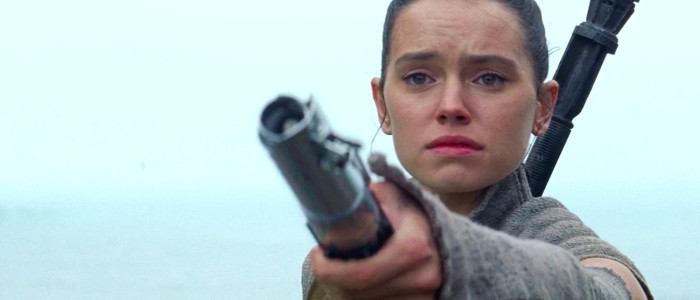
A Rey of Light
On television, it's easier to create fully fleshed-out characters over the course of several seasons, and for this reason, character arcs can and often do involve meaningful and gratifying romantic relationships. But action-adventure movies simply don't have time for that, especially in films where worldbuilding and the Hero's Journey are of paramount importance. Therefore, though these stories don't begin by fixating on the protagonist securing a love interest, they often include a Big Romantic Moment as a shorthand way of marking the end of the protagonist's journey. If the protagonist is a man, this means simply that the romance achievement has been unlocked – that he "got the girl." If the protagonist is female, this means that she is only now a complete human being – she earned her "happily ever after."But The Force Awakens introduces Rey as someone who is waiting not for her prince, but for her family, as she seeks her place in the universe. Star Wars is big on the concept of found families (or "chosen families") – think the Ghost crew on Rebels, the Han-Luke-Leia dynamic in the original trilogy, and the burgeoning trio of Rey-Finn-Poe in the new trilogy. You'll notice that the much-maligned prequel trilogy did not have this type of joint-mission camaraderie to propel its emotional core. Instead – yep – there's the doomed Anakin and Padmé romance. Which is more compelling?Since Rey is the chief protagonist of the sequel trilogy, it's obviously unlikely that she's going to be killed for someone else's character development. But it's also not unlikely that, given the massive international appeal of the Star Wars films, Lucasfilm might be tempted into safe and conventional Hollywood tropes. Which is why I'm hoping Rey doesn't have a romance plot in The Last Jedi and beyond. After all, Luke Skywalker himself didn't have one – and he's one of the greatest fictional heroes of our time.We can pat ourselves on the back for having shied away from the inherent subservience of "someday my prince will come," but to quote another Disney princess: I want more. I want to see Rey come into her own on her own. Parental figures, grumpy mentor figures, and close friendships are great, but this is also an opportunity for a young woman to stand strong on the big screen without the safety net of a man alongside her. And if there is a scene in The Last Jedi in which Kylo Ren holds out his hand to Rey, I hope she doesn't take it. Because Rey, at least, knows how to run without someone holding her hand.
